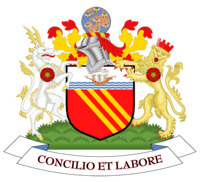Manchester City Council
| Manchester City Council | |
|---|---|
| Third of council elected three years out of four | |

Coat of arms
|
|
| Type | |
| Type | |
| Houses | Unicameral |
|
Term limits
|
None |
| History | |
| Founded | 1 April 1974 |
| Leadership | |
|
Leader
|
|
|
Carl Austin behan, labour
Since 2016 |
|
| Structure | |
| Seats | 96 |
 |
|
|
Political groups
|
|
|
Joint committees
|
Greater Manchester Combined Authority Greater Manchester Police and Crime Panel |
| Elections | |
| First past the post | |
|
Last election
|
2014 (one third of councillors) 2015 (one third of councillors) 2016 (one third of councillors) |
|
Next election
|
2018 (one third of councillors) 2019 (one third of councillors) 2020 (one third of councillors) |
| Motto | |
| Concilio et Labore | |
| Meeting place | |
 |
|
| Manchester Town Hall, Albert Square, Manchester | |
| Website | |
| http://www.manchester.gov.uk | |
Manchester City Council is the local government authority for Manchester, a city and metropolitan borough in Greater Manchester, England. It is composed of 96 councillors, three for each of the 32 electoral wards of Manchester. The council is controlled by the Labour Party and led by Sir Richard Leese. Sir Howard Bernstein is the chief executive. Many of the council's staff are based at Manchester Town Hall.
Manchester was incorporated in 1838 under the Municipal Corporations Act 1835 as the Corporation of Manchester or Manchester Corporation. It achieved city status in 1853, only the second such grant since the Reformation. The area included in the city has been increased many times, in 1885 (Bradford, Harpurhey and Rusholme), 1890 (Blackley, Crumpsall, part of Droylsden, Kirkmanshulme, Moston, Newton Heath, Openshaw, and West Gorton), 1903 (Heaton), 1904 (Burnage, Chorlton cum Hardy, Didsbury, and Moss Side), 1909 (Gorton, and Levenshulme), 1931 (Wythenshawe: Baguley, Northenden, and Northen Etchells), and Ringway. A new Town Hall was opened in 1877 (by Alderman Abel Heywood) and the Mayor of Manchester was granted the title of Lord Mayor in 1893.
Under the Local Government Act 1972 the council was reconstituted as a metropolitan borough council in 1974, and since then it has been controlled by the Labour Party. In 1980, Manchester was the first council to declare itself a nuclear-free zone. In 1984 it formed an equal opportunities unit as part of its opposition to Section 28.
Elections are usually by thirds (a third of the seats elected, three years in every four), although the 2004 elections, due to substantial boundary changes (which involved the total number of councillors reduced), saw all seats contested. Labour has controlled a majority of seats in every election since the council was reconstituted. Between 2014 and 2016 Labour occupied every seat with no opposition. In the local elections held on the 5th May 2016, former Manchester Withington MP, John Leech, was elected with 53% of the vote signifying the first gain for any party other than Labour for the first time in six years in Manchester and providing an opposotion for the first time in two years.
...
Wikipedia
